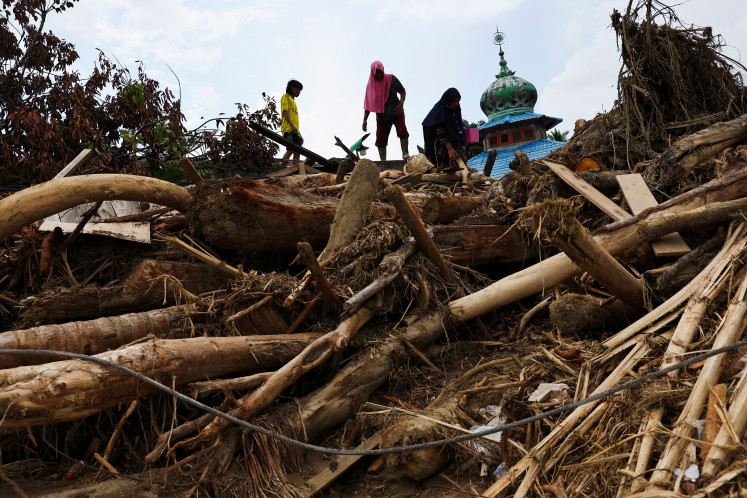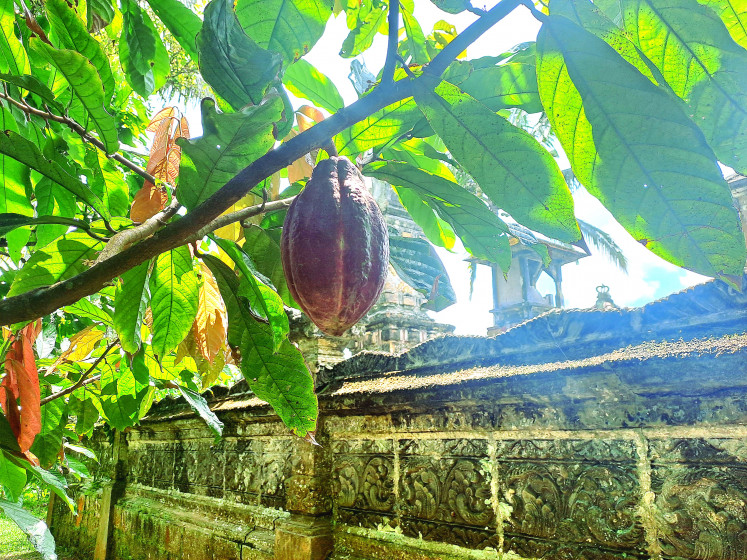Popular Reads
Top Results
Can't find what you're looking for?
View all search resultsPopular Reads
Top Results
Can't find what you're looking for?
View all search results‘Twilight in Jakarta’ - A portrait of a nation on the brink of disintegration
Among its many virtues, perhaps the most striking thing about Mochtar Lubis’ Twilight in Jakarta is that although written more than half a century ago in the 1950s, the novel illustrates that the fundamental tensions of Indonesian political life have changed little in the intervening years
Change text size
Gift Premium Articles
to Anyone
Among its many virtues, perhaps the most striking thing about Mochtar Lubis’ Twilight in Jakarta is that although written more than half a century ago in the 1950s, the novel illustrates that the fundamental tensions of Indonesian political life have changed little in the intervening years.
A cursory reading of contemporary Indonesian newspapers confronts the reader with the problems of entrenched corruption, poverty, the manifold difficulties of erecting a functional democracy after years of authoritarian rule, the deep and ever-present fear of separatism and the specter of a metastasizing militant Islam that wants to up-end it all in a fire-swell of religiosity.
In the pages of Twilight in Jakarta, many of the same forces are at work. Mochtar’s journalistic novel ropes together a range of characters and uses them to embody the corruption, philosophical warfare and political malfunction in Indonesia’s early years after its birth as an independent nation.
Behind the façade of Pancasila, the ideas of communism and anticommunism, existentialism, the unwieldiness of democracy pitted against the perceived sureties of authoritarianism, whether to look to the West, the East, or neither in building Indonesia’s future prosperity and a kind of proto-Islamism all jostle against one another to generate such chaos that Mochtar seemed to be warning his readers that the center was not holding.
Twilight in Jakarta is a political novel, but Indonesia, as it does in so many ways, defies easy categorization, and perhaps Western left-right distinctions have little meaning in this country. Indonesia has call to regard itself as exceptional in a manner similar to the United States because of the myriad ways in which it dismantles popularly received notions of how the world works.
Majority-Muslim but moderately tolerant and democratic before it became rich are the two main phenomena that grant Indonesia a strong claim to exceptionalism. Nonetheless, Western political traditions have infiltrated Indonesia and one hears echoes of these in Mochtar’s novel.
Perhaps the loudest literary echo of all is that of John Steinbeck, and in particular his novel In Dubious Battle.
Steinbeck, America’s leftist bard, writes unforgettably in the novel about brutalized farm-workers in depression-era California who strike against their exploitative overlords.
The strike is hijacked by a local communist outfit and Steinbeck proceeds to portray the communist wing of the 20th century left as a cruel and manipulative enterprise that cares only for the realization of its ideological dream and is willing to dispense with human life in pursuit of that endeavor.
Like Steinbeck, Mochtar occupies a position which might inadequately be called left-wing but staunchly anticommunist. The character of Achmad personifies Mochtar’s attitude towards communism.
Achmad, a machiavellian fanatic, having accepted in totality the doctrines of Marxism, exterminates all other contrary lines of thought, and dedicates himself to the establishment a supreme communist state. He suppresses a wages strike by hungry and desperate dock-workers because it doesn’t align with communist party interests and in the symbolic climax of the novel, instigates a mob riot to orchestrate the death a democracy-advocate.
Although Twilight in Jakarta is primarily a political novel, a novel of ideas, we should also recognize its great strength as a journalistic novel.
Like Steinbeck, Mochtar employs a stripped-down prose style to render in sharp relief the brutal realities of life for those ensconced in poverty in Jakarta during the Sukarno era.
The “City Beat” sections which intersperse the novel paint a panoramic portrait of Jakartan life and bear newspaper witness to the desperation experienced by so many in the city.
Through the characters of Saimun and Itam, Mochtar shows the reader the ultimate cost of corruption and political and economic dysfunction.
The two men work as garbage collectors, but dream of one day working as drivers. Hunger consumes their bodies. Every rupiah counts, but there is never enough of it to stave of hunger. Pain and exhaustion are permanent fixtures, like the sun and the moon and the heat of Java.
In Twilight in Jakarta, Mochtar tried to chart a path forward for Indonesia’s future which would have inoculated the country from totalitarian impulses while simultaneously taming the corruption and chaos engulfing its democratic infancy.
The Mochtar line of thinking says that the only way out of poverty and barbarity is a thoroughly unglamourous one. There are no total, unifying doctrines which can solve forever our place in the world. There is no single great man, or single great book, who can lead us to salvation. We can never hope for some all-consuming panacea. All that we can hope for is the suppression of corruption and the slow, messy work of democratic governance, which will, inch by inch, improve life on earth.
In contrast with the seductive promises of authoritarian government, the Mochtar position has always been a fragile one.
Indeed, the Mochtar line of thinking soon lost out, and Indonesia fell into decades of authoritarianism after a spasm of intense violence. At the dawn of a new century, Indonesia finds itself once again a boisterous, chaotic, democratic behemoth, confronting the same tensions adumbrated in Twilight in Jakarta; poverty, corruption, the spectres of seperatism and fundamentalist Islam and the haunting shadow of an historical injustice.
Twilight in Jakarta
By Mochtar Lubis
Translated by Claire Holt
The Lontar Foundation, 2015
215 pages










